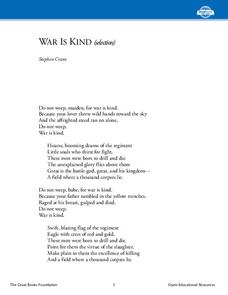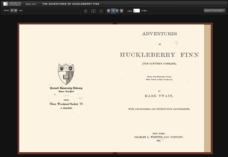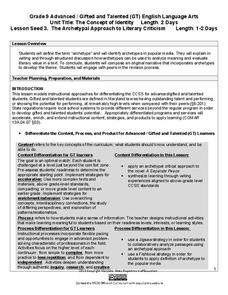Great Books Foundation
Discussion Guide for Little Women
Start with the question in mind with a discussion activity on Louisa May Alcott's Little Women. With four focus questions, note-taking prompts, and discussion points, readers practice answering thematic questions based on textual evidence.
Great Books Foundation
Discussion Guide for Handmaid's Tale
Great literature discussions are a consequence of carefully crafted questions, interpretative questions that permit more than one response, and responses supported by specific evidence from the text. The discussion questions in a guide...
Great Books Foundation
The Glass of Milk
It's not easy to ask for help. Learn why a boy on a ship struggles with accepting help in "The Glass of Milk," a short story by Manuel Rojas. Six discussion questions prompt class members to make inferences from the text about character...
Great Books Foundation
War Is Kind
Ponder the complexities of war, peace, and country with Stephen Crane's "War is Kind." After reading the poem, learners answer six questions in a class discussion or as an individual assessment.
Smithsonian Institution
Water/Ways: The Poetry of Science
Water is the source of life. It appears in poetry in both peaceful and torrential descriptions; it appears in earth science in its liquid, gaseous, and solid states. Combine these interpretations of our planet's most precious and...
Penguin Books
A Teacher's Guide to the Signet Classic Edition of William Shakespeare's Julius Caesar
Are the lessons of Shakespeare's Julius Caesar still applicable today? Explore themes, characterization, and plot structure with a thorough teacher's guide to the play. The resource covers the entire text and offers rigorous activities...
Planet e-Book
Pride and Prejudice
Elizabeth Bennet and Mr. Darcy have captured the heart of readers since Pride and Prejudice was first published in 1813. An eBook version of Jane Austen's novel gives learners a chance to read about the classic characters.
Planet e-Book
Wuthering Heights
Though it is Emily Bronte's only novel, Wuthering Heights became one of the greatest of all-time. The classic novel gets an update in the form of an eBook. Readers learn about Heathcliff, Catherine, Edgar, and the other characters in a...
Film Education
Nineteen Eighty-Four: Orwell
Warning or prediction? Nineteen Eighty Four is the anchor text for a series of tasks that ask readers to compare the novel to the film as well as current events to those pictured in George Orwell's dystopian classic.
Planet e-Book
Les Miserables
Many consider Les Miserables to be one of the greatest novels ever written. An eBook version of Les Miserables by Victor Hugo contains the entire text, translated from the original French. Each section is organized into books and...
Planet e-Book
David Copperfield
Don't let the length scare you away. An eBook version of David Copperfield contains all 1,307 pages of the story. This digital version of the classic coming-of-age novel follows the title character from childhood into adulthood, giving...
Library of Congress
The Adventures of Huckleberry Finn
The Adventures of Huckleberry Finn is one of the best-known pieces of American literature. An eBook from the Library of Congress provides access to an early edition of the text. Original layout and illustrations are preserved within.
National Endowment for the Humanities
How "Grand" and "Allied" Was the Grand Alliance?
Learn more about the Grand Alliance with a scaffolded lesson plan that includes four activities. Class members use primary sources to complete a map exercise, understand the goals and objectives of each individual nation, and participate...
University of Virginia
Uncle Tom's Cabin: Finishing the Novel
The reviews for Harriet Beecher Stowe's Uncle Tom's Cabin were as divisive as the novel itself. High schoolers finish the novel unit with an evaluation of the book's initial reviews, its characters' dreams and fears of emancipation, and...
University of Virginia
Uncle Tom's Cabin: Reading the Novel
Teach the importance of context and perspective with a unit focused on Harriet Beecher Stowe's Uncle Tom's Cabin. The first lesson considers the role of female characters and readers, including the gender expectations of the time. The...
University of Virginia
Uncle Tom's Cabin: Starting Out
Prior knowledge is key when starting any novel unit, but it's essential before introducing Uncle Tom's Cabin by Harriet Beecher Stowe. Three lessons provide primary documents, historical discussions, and extended reading activities that...
University of Virginia
Uncle Tom's Cabin: The Text
Harriet Beecher Stowe's groundbreaking work Uncle Tom's Cabin is both historically and literarily relevant today. Read the entire text in an easily navigated site that allows learners to select their chapters and easily move to the next...
California Federation of Chaparral Poets, Inc
Poetic Devices
Have everything you need to know about the elements of poetry with a nine-page handout. Split into four categories—word sounds, meanings, arrangement, and imagery—budding poets may reference terms, read definitions, descriptions, and...
Library of Congress
A Christmas Carol
Have you ever wanted to read an early edition of Charles Dickens' A Christmas Carol? Experience the next best thing with an eBook version of the novel. From the haunting first words to the jolly send-off in the conclusion, the eBook...
Planet e-Book
1984
An eBook edition of 1984 is now available for classroom use. George Orwell's famous dystopian novel is downloadable for free for individual computers, tablets, or phones.
University of Virginia
Analyzing Social Commentary in The Adventures of Huckleberry Finn
The Adventures of Huckleberry Finn continues to be one of the most frequently banned books. The satire and social commentary present challenges when using the book as a core text. Direct readers' attention to how Twain uses plot,...
Maryland Department of Education
The Concept of Identity Lesson 8: Propaganda in Visual Media
Visual and print propaganda are featured in a lesson that asks readers of A Separate Peace to examine the techniques used in propaganda from World War I, World War II, presidential elections, and in the novel.
Maryland Department of Education
The Concept of Identity Lesson 5: Motivation - Maslow's Hierarchy of Needs
Maslow's Hierarchy of Needs provides the lens class members use to analyze and evaluate the motivations of the characters in Sylvia Plath's "Initiation" and scenes from Mean Girls. Readers then select a character from A Separate...
Maryland Department of Education
The Concept of Identity Lesson 3: The Archetypal Approach to Literary Criticism
As class members continue their study of approaches to literary criticism, readers examine the symbolism and archetypal patterns in John Knowles' A Separate Peace, and how these parallels are used to develop a theme in the story.

























